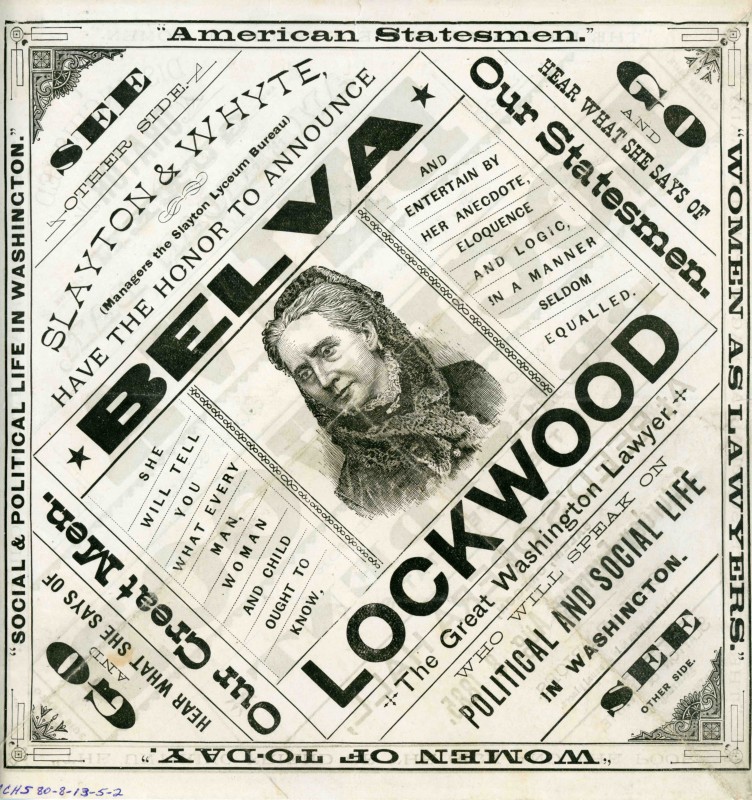
Handbill found in the Willamette Heritage Center’s Collections (WHC 80.8.13.5.2) announces an lecture by Belva Lockwood the famous woman lawyer at Salem’s Reed Opera House in 1885.
The Liberator and Elevator of Women. The Teacher and Lover of Children. The Untiring Friend of the Sick and the Poor. The Erudite Scholar and Accomplished Lady. The distinguished orator and queen of the American Bar. The Champion of Equal Civil and Political Rights. These are just a few of the accolades printed on a handbill that circulated through Salem in the summer of 1885, announcing the upcoming appearance of Belva Lockwood at Reed’s Opera House. For all her accomplishments, I am embarrassed to admit that when I first opened the box containing the wispy paper, I had no clue who Belva Lockwood was. What caught my eye was the bold headline: “…nominated for President of the United States,” opposite the incongruous engraving of a Victorian woman in a high lacey collar and mantilla. Did I miss something in my American History class?
Some quick background research revealed that Belva Lockwood’s story really does live up to the flashy claims of her Chicago-based speaking tour managers. As a young widow and single mother, she put herself through college, earning a Bachelor of Science degree in 1857.[1] Upon hearing Susan B. Anthony speak, Lockwood was inspired to fight for women’s rights and pursue a political career.[2] She moved to Washington D.C., brazenly applied for a job leading U.S. Consulate in Ghent, established one of the city’s first co-educational schools and applied to law school. After several rejections, she was eventually allowed to attend classes the new National University Law School. After completing her studies in 1873, she was denied a diploma and the opportunity to appear on the graduation stage with her male classmates. She fought tooth and nail for recognition of her studies and admission to the bar, only achieving both through appeals to and intervention by President Ulysses S. Grant, also the de facto president of her alma matter. Despite setbacks, Lockwood became the first woman to argue a case in the U.S. Supreme Court.[3] She also ran for U.S. President, twice. While she wasn’t the first woman to run for president (that distinction falls to Victoria Woodhull in 1872), she was the first viable female candidate (Woodhull was not yet 35 years old, a constitutional requirement for serving presidents at the time). Lockwood received votes in the 1884 and 1888 as the candidate for the Equal Rights Party. Chew on that for a second, in 1884 a full 36 years before women were granted the right to vote in presidential elections through the 19th amendment, she received 4,194 decidedly male votes for president.[4]
In between elections, Lockwood traveled across the country lecturing on politics and equal rights. Disappointingly, the Salem lecture announced in this handbill apparently never came to pass. Scheduled for Saturday August 8th, I was befuddled when I found no description of the lecture in following day’s paper. The days leading up to the 8th had been replete with advertising for the event. Instead of finding an opulent description of the event so typical of 19th century journalism, I found the same advertisement that had run the previous week with a new time – Thursday evening August 13th.[5] A small notice underneath gave a cryptic explanation of the postponement, claiming Lockwood was “unavoidably detained en route.”[6] I repeated the process of scouring Friday’s paper for a description of Lockwood’s lecture, only to be disappointed again. The Oregon Statesman reported that: “Owing to the many other attractions last evening, including the band concert, only a small audience turned out to hear Mrs. Belva Lockwood, at Reed’s opera house last evening. The audience not being large enough to justify her, she did not deliver her lecture.”[7]
We do know that Mrs. Lockwood did arrive in Salem in August 12th. In an article describing her arrival to town, I finally got the effusive reporting on the celebrity appearance I had been anticipating. One can almost see a mustachioed reporter lying in wait at the train station for a glimpse of the famous lady lawyer. “Mrs. Lockwood appears a woman of doubtful age, pleasant countenance, clear forehead over which falls a mat of wavy greyish hair, that gives to the face an attractiveness seldom met with. Her eyes which are of bark shade, are bright and full of intelligence, and that sparkling something usually termed “snap.” She was modestly dressed, in a dark traveling suit, and a light shawl protected her head from the sun’s beaming rays (which any one knows, usually beam pretty lively in the vicinity of the depot, where the STATESMAN reporter merely had time for a casual glance at her before she entered the carriage for the city). She is said to be one of the most accomplished female speakers on the rostrum, and it is expected a good house will greet here on Thursday night.”[8] Alas his prediction would not ring true, and we are left with a small token of a speech that never was.
Sources
[1] “Belva Lockwood.” A to Z Of Women in World History edited by Erika Kuhlman. Facts on File, 2002.
Lockwood, Belva A. “My Efforts to Become a Lawyer.” Lippincott’s Monthly Magazine, February 1888, page 218. Accessed via web transcription” www.janetkagan.com/
[2] Lockwood, Belva A. “My Efforts to Become a Lawyer.” Lippincott’s Monthly Magazine, February 1888, page 218. Accessed via web transcription” www.janetkagan.com/
[3] “Belva Lockwood.” A to Z Of Women in World History edited by Erika Kuhlman. Facts on File, 2002.
[4] “Biographical Note. Belva A. Lockwood Collection. New York State Library. SC21041. Accessed via website: http://www.nysl.nysed.gov/msscfa/sc21041.htm
[5] At the time of Lockwood’s appearance, Salem had two daily papers – The Oregon Statesman and the Capital Journal. I could find no mention of Lockwood’s appearance in the Capital Journal. Advertisements appear in the Oregon Statesman on August 4, 5, 6, 8, 9, 10, 12 and 13th.
[6] “Lecture Postpone.” Oregon Statesman. 9 Aug 1885
[7] “Mrs. Lockwood.” Oregon Statesman. 14 Aug 1885, page 3.
[8] “Arrived.” Oregon Statesman. 12 Aug 1885, page 3.
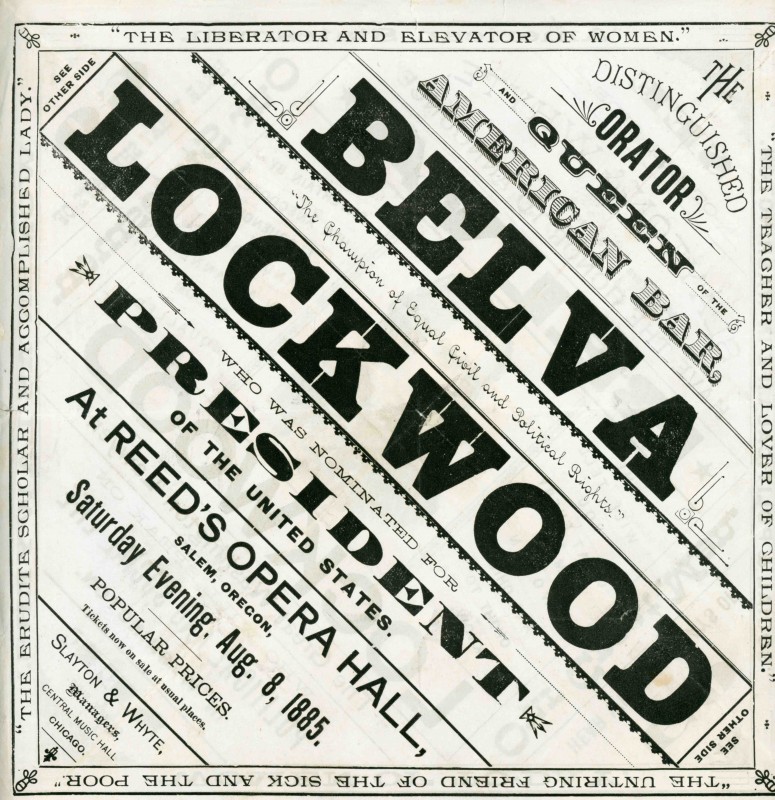
Handbill found in the Willamette Heritage Center’s Collections (WHC 80.8.13.5.2) announces an lecture by the famous woman lawyer at Salem’s Reed Opera House in 1885.
This article was first published in the Statesman Journal on April 1, 2018. It is reproduced here with citations for reference purposes. Although it sounds a bit like an April Fools joke, it is the cold, hard truth.



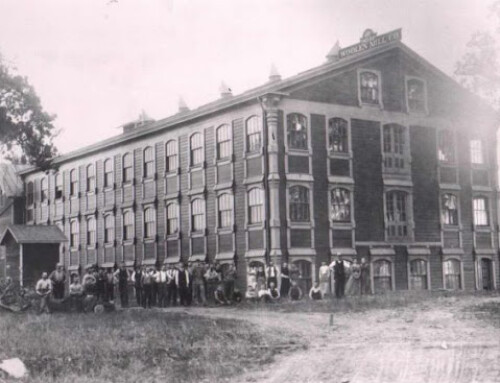
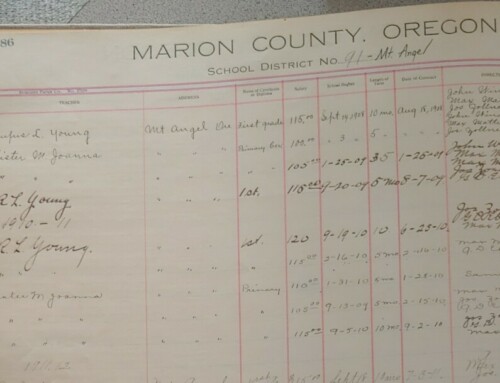
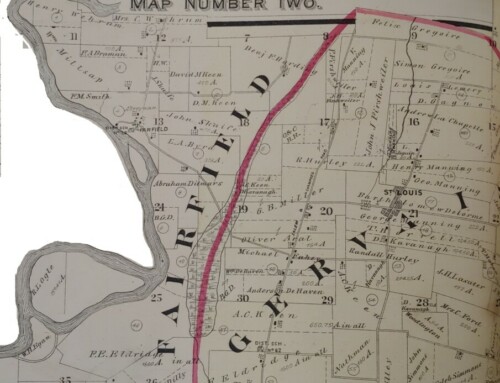
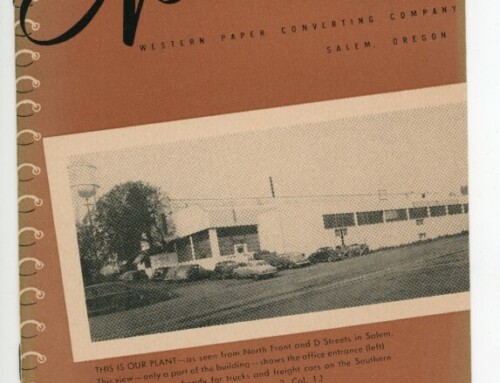
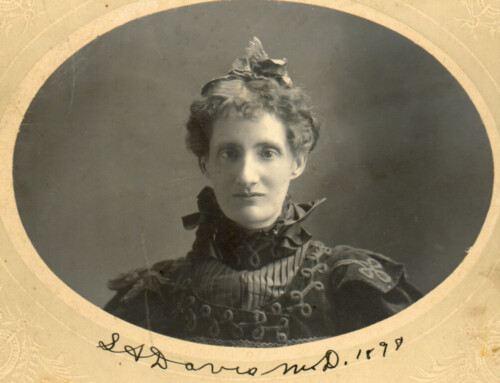
Leave A Comment